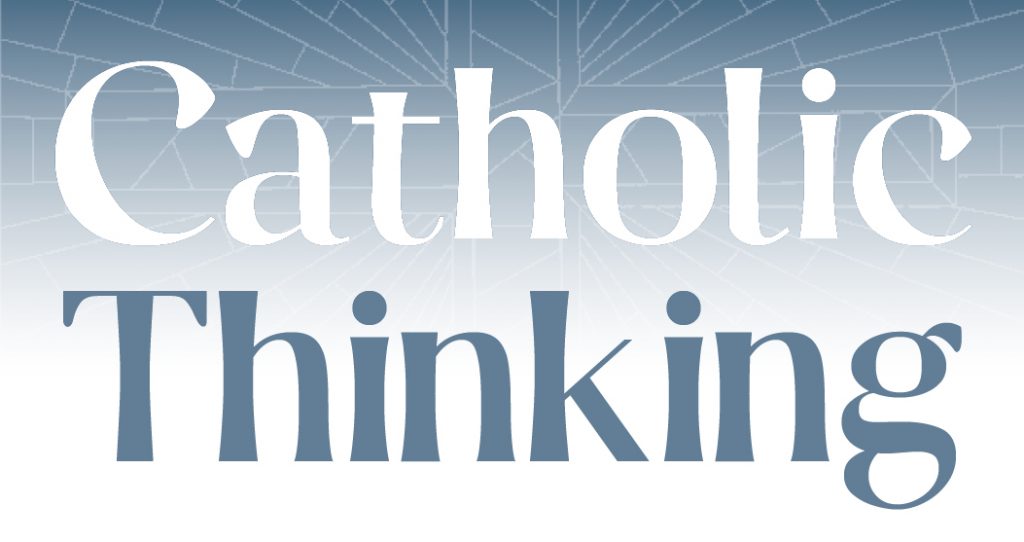WelCom May 2020:
Professor Thomas O’Loughlin, Professor of Historical Theology at the University of Nottingham, UK, and a priest of the Archdiocese of Arundel and Brighton on England’s south coast, continues his six-part series for WelCom.
Thinking beyond the box: Christians and Other People
Repeat anything often enough and not only will people believe it – hence the constant repetition of adverts and why so much energy goes into ‘building brands’ – but eventually, people will forget that there are completely different ways of thinking about a problem. One of the duties of theology is to stop us in our tracks, when those tracks have become ruts, and get us to look afresh at reality, our place in it, and what it is all about. Here I want to consider a situation where this applies.
Living in a post-religious world: Are people really not ‘religious’?
One of the most significant cultural developments of recent decades across the developed world is the number of people who reject any recognised form of religion, who say they do not believe in God or a god, or who ignore organised religion in their lives with the simple statement: ‘I’m not religious!’.
Christians respond to this situation in a variety of ways. One obvious reply is to try to ‘convert’ them to accepting the traditional language, vision and practices of Christianity. After all, this is the basis of all missionary plans when missions were sent out in areas that had never heard of the Christ and there they won many new people for the faith. So why should they not view the society around them as ‘a new pagan land’ and preach to such people?
While it is true that Christians must always proclaim Jesus as the Lord’s Christ, addressing fellow citizens does not seem to have the same impact as missionaries had in parts of Africa in the twentieth century. Part of the reason for this is that the languages and practices of Christianity appear to many post-Christian societies as simply an appeal to go backwards. Christianity – at least in its traditional language and practice – is explicitly that from which many are running away (and often for very good reasons); and they cannot abide the notion of returning. Inviting people to ‘come home’ to Christianity is equivalent to saying they should love the technology of the early twentieth-century; the social views such as the restrictions on women of the nineteenth-century; or the religious clashes and bitterness of even earlier.
The situation is that they have tried Christianity and found it wanting. It is so easy to imagine this post-Christian situation is the equivalent to being a-religious – as so many claim: but this, for those who believe in God the creator, would be a great mistake. Post-Christian does not equate to being without religious longings.
But does that mean they are godless, that the great questions do not trouble them, or that for this generation Augustine’s claim that every heart is unquiet until it rests in God (Confessiones 1,1,1,) is no longer true?
If it is true that they are truly godless, then it must be a case that now, for the first time in history, there are hearts and minds in which the Holy Spirit is no longer speaking. To say they are godless is tantamount to saying that God has gone away. But part of the good news of the creation is that God never goes away and in every heart his Spirit is somehow active. It means the quest for God is taking new forms, finding different expressions, and the challenge facing Christians is twofold.
First, for themselves to recognise these new expressions of God’s presence in human life and work – and not assume that God only speaks in the older language with which they are familiar.
Second, to help their fellow citizens recognise for themselves these divine stirrings, the deep human need for the Infinite, and to forge with them a new language – a language and religious culture and practice – that belongs to today and tomorrow (rather than being that of yesterday spruced up for today).
This view of the situation of modern women and men was elegantly summed up at the Second Vatican Council over 50 years ago:
‘For since Christ died for all, and since the ultimate destiny of all humanity is the same, namely divine, we must hold that the Holy Spirit offers all of us the possibility, in a way known to God, of being made partners in the Paschal Mystery.’ (Gaudium et Spes 22.5)
But finding this new ‘language’ is very difficult – it is even more difficult than learning a foreign language because we do not know its grammar – and then we have to translate our older ‘language’ into it.
In this task of translating the Christian past into the human situation of today and tomorrow, theology plays a crucial role.
So, every study of theology is intrinsically an act of mission – and no explicit missionary act can take place without theological reflection.
Put bluntly, the more people say, ‘I’m not religious,’ the more those who profess faith need the skills of theology.
